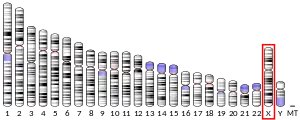Arylsulfatase E
Arylsulfatase E, also known as ARSE, is an enzyme that, in humans, is encoded by the ARSE gene.[3]
| ARSL | |||||||||||||||||||||||||
|---|---|---|---|---|---|---|---|---|---|---|---|---|---|---|---|---|---|---|---|---|---|---|---|---|---|
| Identifiers | |||||||||||||||||||||||||
| Aliases | ARSL, ASE, CDPX, CDPX1, CDPXR, arylsulfatase E (chondrodysplasia punctata 1), arylsulfatase E, arylsulfatase L, ARSE | ||||||||||||||||||||||||
| External IDs | OMIM: 300180 HomoloGene: 55428 GeneCards: ARSL | ||||||||||||||||||||||||
| |||||||||||||||||||||||||
| |||||||||||||||||||||||||
| Orthologs | |||||||||||||||||||||||||
| Species | Human | Mouse | |||||||||||||||||||||||
| Entrez |
| ||||||||||||||||||||||||
| Ensembl |
| ||||||||||||||||||||||||
| UniProt |
| ||||||||||||||||||||||||
| RefSeq (mRNA) |
| ||||||||||||||||||||||||
| RefSeq (protein) |
|
| |||||||||||||||||||||||
| Location (UCSC) | Chr X: 2.93 – 2.97 Mb | n/a | |||||||||||||||||||||||
| PubMed search | [2] | n/a | |||||||||||||||||||||||
| Wikidata | |||||||||||||||||||||||||
| |||||||||||||||||||||||||
Function
Arylsulfatase E is a member of the arylsulfatase subfamily of sulfatase enzymes that catalyze the hydrolysis of sulfate esters. It is glycosylated postranslationally and localized to the golgi apparatus. Sulfatases are essential for the correct composition of bone and cartilage matrix.[4]
Clinical significance
Deficiencies in ARSE are associated with X-linked recessive chondrodysplasia punctata, a disease characterized by abnormalities in cartilage and bone development.[5]
References
- GRCh38: Ensembl release 89: ENSG00000157399 - Ensembl, May 2017
- "Human PubMed Reference:". National Center for Biotechnology Information, U.S. National Library of Medicine.
- Franco B, Meroni G, Parenti G, Levilliers J, Bernard L, Gebbia M, Cox L, Maroteaux P, Sheffield L, Rappold GA (April 1995). "A cluster of sulfatase genes on Xp22.3: mutations in chondrodysplasia punctata (CDPX) and implications for warfarin embryopathy". Cell. 81 (1): 15–25. doi:10.1016/0092-8674(95)90367-4. PMID 7720070.
- "Entrez Gene: ARSE".
- Brunetti-Pierri N, Andreucci MV, Tuzzi R, Vega GR, Gray G, McKeown C, Ballabio A, Andria G, Meroni G, Parenti G (March 2003). "X-linked recessive chondrodysplasia punctata: spectrum of arylsulfatase E gene mutations and expanded clinical variability". Am. J. Med. Genet. A. 117A (2): 164–8. doi:10.1002/ajmg.a.10950. PMID 12567415.
Further reading
- Stelzl U, Worm U, Lalowski M, et al. (2005). "A human protein-protein interaction network: a resource for annotating the proteome". Cell. 122 (6): 957–68. doi:10.1016/j.cell.2005.08.029. PMID 16169070.
- Puca AA, Zollo M, Repetto M, et al. (1997). "Identification by shotgun sequencing, genomic organization, and functional analysis of a fourth arylsulfatase gene (ARSE) from the Xp22.3 region". Genomics. 42 (2): 192–9. doi:10.1006/GENO.1997.4716. PMID 9192838.
- Parenti G, Buttitta P, Meroni G, et al. (1997). "X-linked recessive chondrodysplasia punctata due to a new point mutation of the ARSE gene". Am. J. Med. Genet. 73 (2): 139–43. doi:10.1002/(SICI)1096-8628(19971212)73:2<139::AID-AJMG7>3.0.CO;2-P. PMID 9409863.
- Nino M, Matos-Miranda C, Maeda M, et al. (2008). "Clinical and molecular analysis of arylsulfatase E in patients with brachytelephalangic chondrodysplasia punctata". Am. J. Med. Genet. A. 146A (8): 997–1008. doi:10.1002/ajmg.a.32159. PMID 18348268.
- Meroni G, Franco B, Archidiacono N, et al. (1996). "Characterization of a cluster of sulfatase genes on Xp22.3 suggests gene duplications in an ancestral pseudoautosomal region". Hum. Mol. Genet. 5 (4): 423–31. doi:10.1093/hmg/5.4.423. PMID 8845834.
- Maruyama K, Sugano S (1994). "Oligo-capping: a simple method to replace the cap structure of eukaryotic mRNAs with oligoribonucleotides". Gene. 138 (1–2): 171–4. doi:10.1016/0378-1119(94)90802-8. PMID 8125298.
- Strausberg RL, Feingold EA, Grouse LH, et al. (2001). "Generation and initial analysis of more than 15,000 full-length human and mouse cDNA sequences". Proc. Natl. Acad. Sci. U.S.A. 99 (26): 16899–903. doi:10.1073/pnas.242603899. PMC 139241. PMID 12477932.
- Urbitsch P, Salzer MJ, Hirschmann P, Vogt PH (2000). "Arylsulfatase D gene in Xp22.3 encodes two protein isoforms". DNA Cell Biol. 19 (12): 765–73. doi:10.1089/104454900750058125. PMID 11177574.
- Daniele A, Parenti G, d'Addio M, et al. (1998). "Biochemical characterization of arylsulfatase E and functional analysis of mutations found in patients with X-linked chondrodysplasia punctata". Am. J. Hum. Genet. 62 (3): 562–72. doi:10.1086/301746. PMC 1376941. PMID 9497243.
- Suzuki Y, Yoshitomo-Nakagawa K, Maruyama K, et al. (1997). "Construction and characterization of a full length-enriched and a 5'-end-enriched cDNA library". Gene. 200 (1–2): 149–56. doi:10.1016/S0378-1119(97)00411-3. PMID 9373149.
External links
- Human ARSE genome location and ARSE gene details page in the UCSC Genome Browser.
This article incorporates text from the United States National Library of Medicine, which is in the public domain.
This article is issued from Wikipedia. The text is licensed under Creative Commons - Attribution - Sharealike. Additional terms may apply for the media files.

